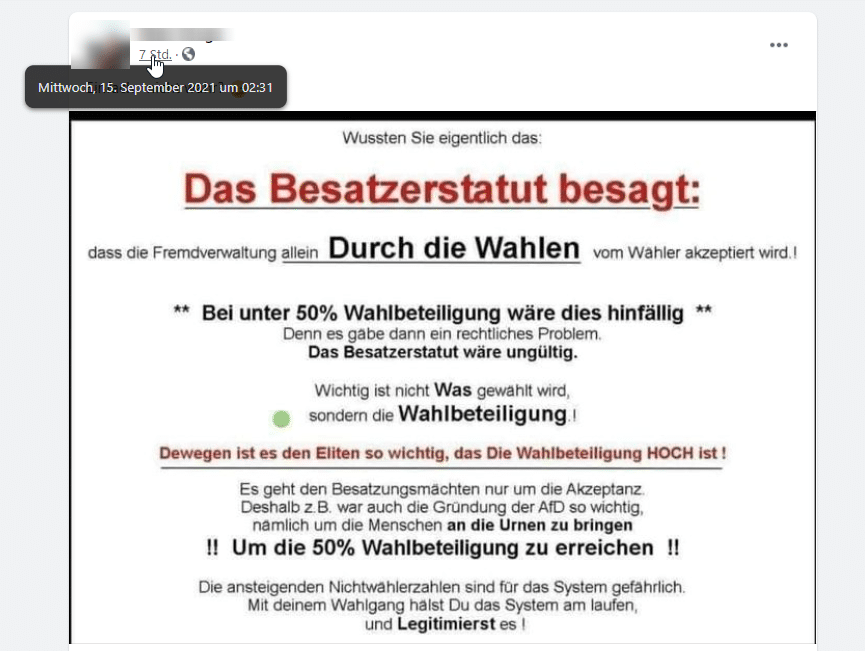Are elections with less than 50% turnout invalid? We had this topic on our table a year ago and we had already reported on it back then.
On a sharepic, which is currently being shared again on Facebook and CO, there is a strange claim about an occupier statute and voter turnout. According to an occupier statute, elections should be invalid if voter turnout is below 50%. The elections would then be invalid and the occupier statute would be repealed.
It's this sharepic:
The sharepic says:
“Did you actually know this:
The occupier statute says:
that the foreign administration is only accepted by the voters through the elections!
** If voter turnout was less than 50%, this would be invalid **
Because there would be a legal problem.
The occupier statute would be invalid.
What is important is not what is voted for,
but the turnout!”
In addition, it is implied that the AfD may have been founded by the “elites” in order to keep voter turnout high so that the occupier statute continues to apply.
What should the occupier statute be?
That does not exist. But what there was was the occupation statute !
This was a document in which the powers and responsibilities between the future German government and the Allied Control Authority were regulated from September 21, 1949.
Among other things, it says that the occupying powers agreed that the Federal Republic should govern itself as much as possible, as long as the governments' goals are not directed against the occupying powers themselves.
Changes to the Basic Law, for example, had to be legitimized by the occupying powers; Germany only gained sovereignty step by step. The occupation did not end with the founding of the Federal Republic, but was relaxed step by step.
On May 5, 1955, the Paris Treaties ratified: Germany regained sovereignty. WEU on May 7th and NATO on May 9th.
However, this sovereignty was still limited; for example, the Allies were still allowed to take full control of state power in the event of an emergency
That special status under international law was then ended with the Two Plus Four Treaty, which came into force on March 15, 1991, and the Federal Republic of Germany thus became completely sovereign.
“In Article 7 Paragraph 1 of the Treaty, the four victorious powers end their rights and responsibilities with regard to Berlin and Germany as a whole. The united Germany – according to paragraph 2 – therefore has full sovereignty over its internal and external affairs.”
And what about the minimum voter turnout?
They don't exist, neither then nor now.
Article 38 (1) of the Basic Law states that the members of the Bundestag are elected by general, direct, free, equal and secret ballot; there is no regulation that one has to vote or how high the turnout must be.
Federal Returning Officer makes it even clearer when it comes to the issue of the validity of an election:
“ The question is often asked as to whether the level of voter turnout has an influence on the validity of the election. This is not the case. An election can only be annulled in whole or in part as part of an election challenge in accordance with Section 49 of the Federal Elections Act or Section 26 of the European Elections Act due to election errors. However, if a person entitled to vote voluntarily decides not to vote, there is no reason for a contestable voting error. Therefore, even if there is a very low voter turnout, the election is valid if it took place without any reason for contesting the election and the election result resulted in the correct composition of parliament.
Conclusion
An “occupier status” (correct: occupation status) only exists in the imagination, and even there was no regulation for a minimum voter turnout. And that doesn't exist today either: voter turnout has no influence on the validity of an election.
Notes:
1) This content reflects the current state of affairs at the time of publication. The reproduction of individual images, screenshots, embeds or video sequences serves to discuss the topic. 2) Individual contributions were created through the use of machine assistance and were carefully checked by the Mimikama editorial team before publication. ( Reason )


